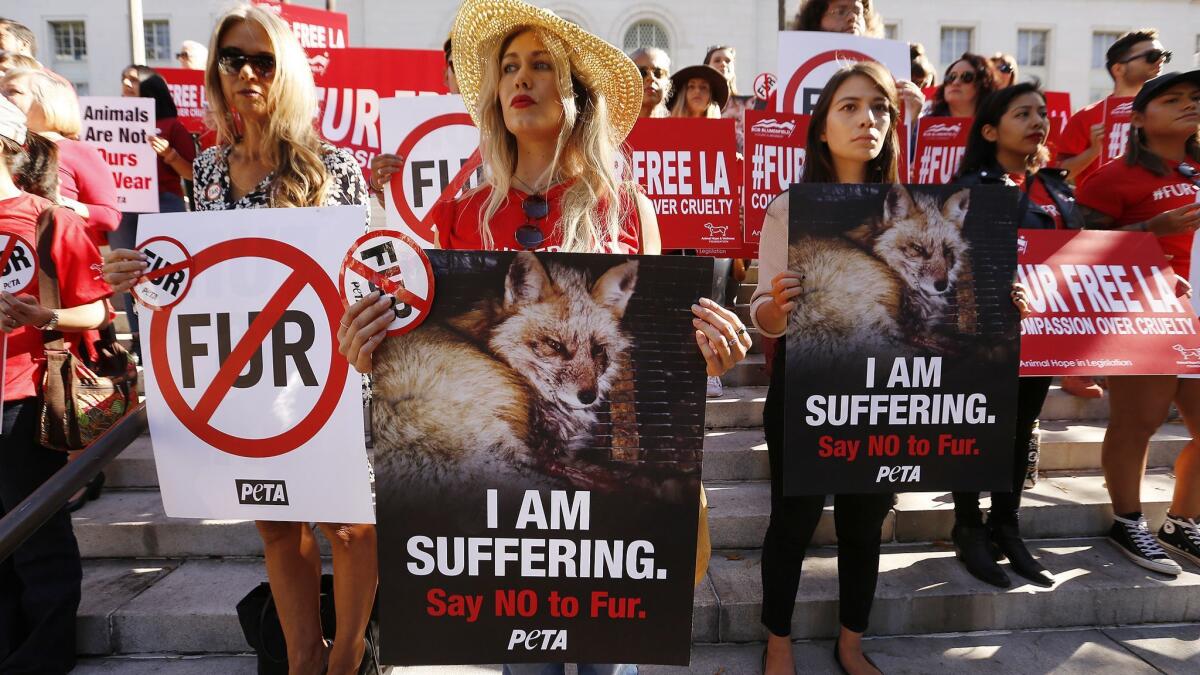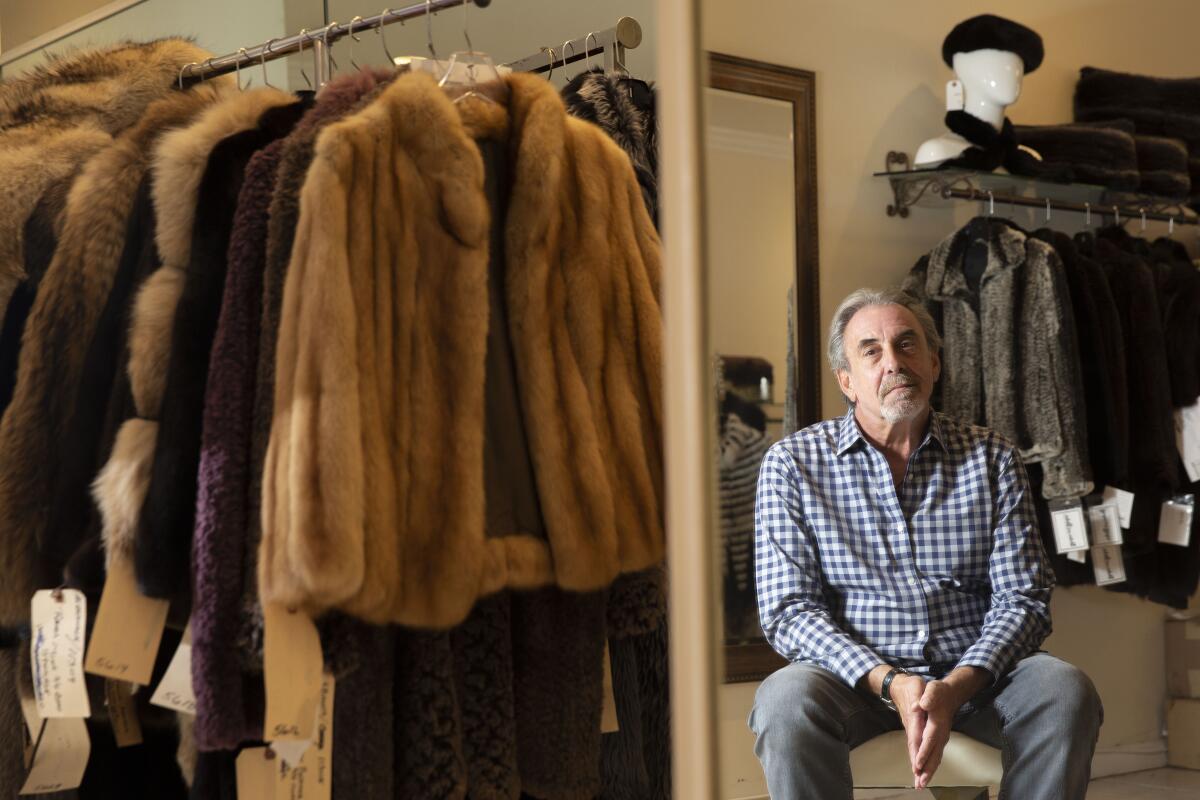California could soon ban sale of new fur products under bill sent to governor

- Share via
SACRAMENTO — New fur coats and mink shawls could soon face extinction in California.
State lawmakers in the Assembly on Wednesday gave final approval to legislation that would outlaw new items made from the fur of undomesticated animals, including mink, rabbit and coyote. If signed into law by Gov. Gavin Newsom, California would be the first state in the nation to ban the sale of new fur products.
Long worn as emblems of wealth, mink coats and other fur products have been increasingly shunned as symbols of cruelty at a time of increasing reverence for wildlife and animal rights.
Assemblywoman Laura Friedman (D-Glendale) said she authored the bill because of “overwhelming evidence” of inhumane practices in the fur industry and the availability of fashionable alternatives.
“If you’re going to buy a garment [off] the rack in California, you should be reasonably assured that an animal didn’t suffer to bring that product to California,” Friedman said.
The legislation received strong support from animal rights advocates, including the Humane Society of the United States. Opposition came from fur product makers and retailers as well as the Los Angeles County Business Federation and Beverly Hills Chamber of Commerce.
The proposed ban now heads to Newsom’s desk for his consideration, and supporters of the bill feel optimistic that he’ll sign it.
Just last week the Democratic governor signed a bill that outlawed fur trapping, making California the first state to impose such a widespread ban on trapping animals for their pelts. A short time later the governor’s office sent out a tongue-in-cheek tweet featuring a stuffed puppet portraying Newsom’s former childhood family pet, an otter named Potter, opining, “My friends & I should not have to live in fear of being trapped & our fur being sold!”
Los Angeles recently became the largest city in the U.S. to ban the sale, manufacture or trade of most fur products. San Francisco, Berkeley and West Hollywood also prohibit fur sales.
The ban also comes amid a wave of new laws in California in recent years to protect animals and wildlife.
California voters in 2018 overwhelming approved a statewide proposition requiring cage-free quarters for egg-laying chickens and other animals being raised for food.
State lawmakers in 2017 outlawed orca breeding and performance programs, such as the one formerly run by SeaWorld theme parks, and banned pet stores from selling cats, dogs or rabbits unless they were obtained from a rescue shelter or public animal control agency.

“If you take care of your environment, if you take care of animals, you teach good stewardship and you also teach compassion,” Friedman said.
Most fur-bearing animals have never been domesticated, which makes raising a fox for the trim of a parka inherently cruel, animal rights activists say. Friedman said many wild animals spend their lives confined to small cages and are killed in disturbing ways that preserve their fur, including anal electrocution.
Republican opponents of the legislation said the bill unfairly targeted a single industry in California and warned that it would do little to curb worldwide demand for fur products.
Sen. Brian Jones (R-Santee) suggested that the push to ban fur discriminates against people in communities who value fur products, including Native Americans and African Americans.
“There’s no reason for this bill other than one class of society telling another class of society what they can and cannot wear,” Jones said.
The legislation, Assembly Bill 44, provides exemptions if fur is used for religious purposes, including for spiritual uses by Native American tribes. Leather products, deerskin, sheepskin and goatskin also are exempt, along with the work of taxidermists.
Antique fur products, such as those handed down from previous generations or sold in used-clothing stores, remain legal. The ban would not go into effect until 2023.
The fur ban would mark a victory for animal rights activists, who for decades protested retailers and fashion designers that included fur products in their clothing lines.
Along with protests, animal rights activists have defaced fur coats by dousing them with red paint, signifying blood, and the anti-fur movement became a cause celebre in the 1980s and 1990s.
In May, Italian fashion house Prada announced it would not use animal fur in future women’s collections, joining luxury designers Michael Kors, Coach, Burberry, Versace and Armani among others to forgo fur.
“Very few were making money off of it, and with social media push from younger activists, millennials, they were getting so much bad publicity about it, it wasn’t worth it,” said Matt Hamity of the San Rafael-based In Defense of Animals.
Still, fur products remain popular even in California.
“No one’s really talking about the human toll here,” said Keith Kaplan, a spokesman for the Fur Information Council of America. “Fur’s a handmade item, [workers] make double minimum wage. Here, there’s a lot of immigrants who have been taught the trade, people who’ve bought homes and now won’t be able to pay their mortgage if this happens.”
Supporters say the passage of AB 44 will spur states such as New York, Hawaii, Minnesota and Ohio to push ahead with bans of their own in what could be a victory for animal rights activists and an economic boon for faux fur manufacturers.
But longtime California furriers say their businesses will struggle to survive if the bill becomes law, despite carve-outs for vintage pelts and agricultural products such as sheepskin.
“It’s not going to put me under, but it affects my retirement plan,” said David Appel of David Appel Furs in Beverly Hills. “I’m a hardworking man, I work 12 hours a day. It should be treated like eminent domain — if you want my property, you pay for it. You don’t just remove the rug from under me.”
For Larry Becker of Dicker and Dicker of Beverly Hills, the bill’s approval by the Legislature came as a shock.
“I’ve spent 40-plus years in this industry — I can’t understand how we’re going to say you can’t buy fur,” he said. “If this ban is [enacted], we’ll be out of business.”
More to Read
Sign up for Essential California
The most important California stories and recommendations in your inbox every morning.
You may occasionally receive promotional content from the Los Angeles Times.











